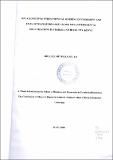| dc.description.abstract | The performance of employees plays a critical part with regards to the success or failure of the organization, with the environment within the workplace having a direct impact on their performance. NGO's in Tharaka Nithi County are faced with the challenge of addressing the factors affecting the performance of their employees, the methods of gauging the performance of the employees and the strategies that can be used to improve employee performance. The lack of recent empirical information on the current situation regarding work environment and the performance of employees in the county shows that there have been no investigations carried out in Tharaka-Nithi County recently. The general objective of the study was to find out the relationship between the physical working environment and the performance of employees among NGO's workers in Tharaka-Nithi County. The specific objectives were on employee training, employee communication, employee remuneration and employee work life balance. The study is guided by the Brian Tracy Four Factor theory, the Affective Event theory and the Expectancy theory. The study employed a descriptive survey research design that targeted all the 55 employees in the registered NGO's in Tharaka-Nithi County, and all employees took part in the study as it was a census. This study employed the use of questionnaires to collect the data. Construct validity and reliability of instruments were done accordingly. The data was analyzed using IBM SPSS Version 23, and descriptive statistics were used to tabulate the percentages and frequencies, while to test the relationship between independent and dependent variables using inferential statistics, the researcher used the chi-square to test the organizations. The study found that employees training influences performance, and the employees are not satisfied with how the training activities are carried out. The results also showed that majority of the employees were dissatisfied with the communication modes. On remuneration, the study found that the reward policy used influences employees performance. However, they disagreed that there is fringe benefit aid to employees. With regards to work-life balance, the study showed that the employees were not given flexibility in terms of their working hours. They also disagreed that the organization provides employees with assistance programs like counselling. Upon testing the hypothesis, the testing for objective one, two and four were rejected while the result for objective three was accepted. The study concludes that training activities are carried out by NGOs in Tharaka-Nithi County, while it was also concluded that the NGOs have not provided their employees with adequate tools for communication. Furthermore, it was concluded that the employees are fairly remunerated, and it was also concluded that the work-life balance is not well addressed by the NGO's. The study recommends that NGOs should come up with clear training policies that are relevant to the employees. Furthermore, it is recommended that employees should be equipped with the relevant communication tools for quick and effective communication. It is also recommended that NGOs should ensure that they continuously review their remuneration policy so as to continuously motivate their workers. Finally, the study recommends that the NGOs should relax their working time so as to cater for the employees work-life balance. | en_US |

